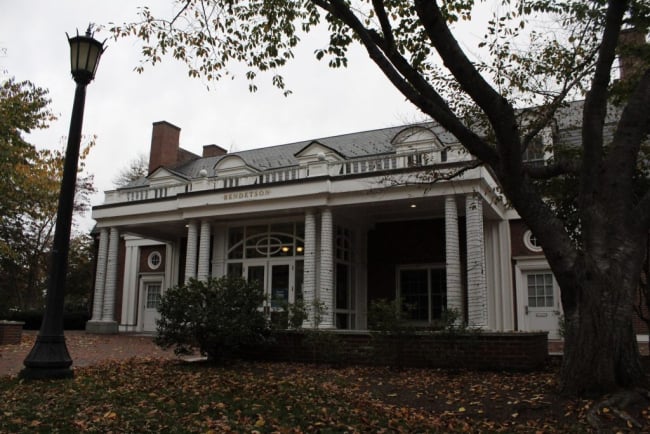You have /5 articles left.
Sign up for a free account or log in.

Bendetson Hall, where Tufts’s admissions office is housed
Natalie Brownsell for The Tufts Daily
Tufts University has retained an external law firm to investigate claims of alleged bias and discrimination against Joseph “JT” Duck, the dean of admissions for the School of Arts and Sciences and the School of Engineering, and other leaders in the admissions office, according to emails obtained by Inside Higher Ed and a former employee who spoke on the condition of anonymity.
Duck, who was hired in 2019, has been the subject of multiple complaints from current and former employees—including allegations of racial discrimination, sexism and creating a “toxic” workplace environment—made through the university’s Office of Equal Opportunity, according to an investigation by The Tufts Daily, the university’s independent student newspaper.
In June, the Somerville, Mass., university retained the law firm McCarter & English to investigate the complaints against Duck and other leaders in the admissions office, according to emails obtained by Inside Higher Ed.
A former Tufts admissions office employee, who requested anonymity to discuss the ongoing investigation with Inside Higher Ed, acknowledged filing two formal discrimination complaints against Duck and making several other informal complaints about other admissions office leaders.
The former employee, who left earlier this year after well over a decade at the university, said colleagues had voiced similar complaints about alleged discrimination in the office. The employee said that under Duck’s leadership, the admissions office has suffered from high turnover—22 employees left since his arrival, according to the Daily—and “lost a lot of talent.”
“I had these young, female staff members of color asking me for advice … Nobody was listening to them,” the former employee said. “People didn’t want to come in to work in such a toxic environment. It was heartbreaking.”
The employee, who is Black, also alleged that Duck played favorites with white male employees, promoting some with pay raises over Black women who had worked there longer or were more qualified. The employee also said that Duck repeatedly ignored or dismissed complaints of microaggressions and alleged discrimination against other members of the admissions office.
“These people are not dumb; they’re not going to be blatantly racist or sexist, they’re going to use microaggressions to get people to leave,” the former employee said. “Microaggressions are hard to prove … but I think they were racially motivated.”
Duck said he couldn’t comment on any details or specific allegations “out of respect for the university’s processes and procedures and the important reasons for maintaining the privacy of all involved.”
“I have always sought to create an environment in which differences are respected and values of diversity, equity, inclusion and belonging are embraced,” he wrote in a statement to Inside Higher Ed. “As a manager, I fully support the right of individuals to raise their thoughts and concerns with me and to seek redress from the university’s established processes if they feel their concerns have gone unheard.”
Patrick Collins, Tufts’s executive director of media relations, said the investigation itself has yet to find any wrongdoing or come to any conclusion about the allegations, but if they were found to be true the university would “take appropriate action.”
“When allegations are made by community members regarding workplace matters, the University regularly reviews those allegations consistent with applicable policies and procedures,” Collins wrote in an email to Inside Higher Ed. “The existence of any such review is not evidence of wrongdoing; it is the first step in a fact-finding process.”
“Public accusations made outside of the applicable process or conclusions drawn before the facts are found are not only fundamentally unfair but also a disservice to all involved and to the process itself,” Collins added.
Another former admissions officer, who also requested anonymity because she still works in admissions at a different institution, said that while she perceived patterns of favoritism and retaliation under Duck—and didn’t want to invalidate the experiences of former colleagues who felt marginalized—she never experienced or observed racial or gender discrimination during her two years in the office.
“I certainly agree that if you were loyal to JT, if you didn’t complain and followed his instructions to a T, you were his favorite and you got rewarded for that … and he did sometimes retaliate against people who spoke up,” she said. “Is that the same thing as discrimination? I don’t know.”
She also said it wasn’t accurate to pin all the problems laid out in the Daily article on Duck, adding that during his tenure, the admissions office made it a point to promote critical thinking about race, gender and privilege in professional development for its employees.
“My introduction to higher education was through the lens of Tufts admissions, and they really did encourage us to reflect on our internal biases and privileges when reading applications,” she said. “At least Tufts was having us think about these things. Not every admissions office does that.”
The former employee who made the complaints said they were “absolutely not” confident the investigation would find any wrongdoing or lead to any repercussions for Duck. But the experience made them wary of working in higher education admissions ever again.
“It was so bad, it changed my entire outlook on higher education,” said the former employee, who earned both undergraduate and graduate degrees from Tufts. “When I started there, I was bleeding brown and blue [Tufts’s official colors] … I don’t even care if my kids go to college anymore. They sure aren’t going to Tufts.”









